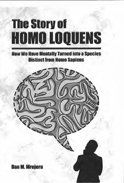
 |
The Story of Homo Loquens: How We Have Changed into Another Species
by Dan M. Mrejeru
Global Summit House
Humans are born with the potential to learn languages. This ability does not leave us as we age. Retention of such a juvenile characteristic as the need or desire to communicate is called neoteny. Through language, we have achieved such goals as effective agriculture and the establishment of complex societies by means of our ability to name their components, such as tools or laws. Human communication is the most outwardly apparent sign of humanity's potential for creativity and innovation. Such creativity also manifests itself in the production of music and other art forms. Ultimately, a perpetually inquisitive human brain is likely to remain healthier—that is, more adaptable to new ideas—than that of someone who deliberately or otherwise stops learning.
Author Mrejeru draws on his expertise across multiple scientific disciplines to explain the evolution of human language and the creativity and imagination of our species. He suggests that because of our ability to acquire language, we have evolved beyond homo sapiens to become homo loquens—literally, "speaking beings." Unusually for a paper concerning evolution, this one does not classify humanity as one of the animal species but as a distinct group of intelligent creatures. At times, the complexity of the subject matter spills over into the sentence structure, making the text somewhat difficult to understand. When this happens, however, the author reinforces his point with supporting quotes by other experts that help clarify the meaning. This paper explains the brain's physical operation during the process of linguistic acquisition. It also details the harmful effects of prolonged excessive entropy (thermal energy) on the brain. It may thus be of particular interest to physicists or neuroscientists.